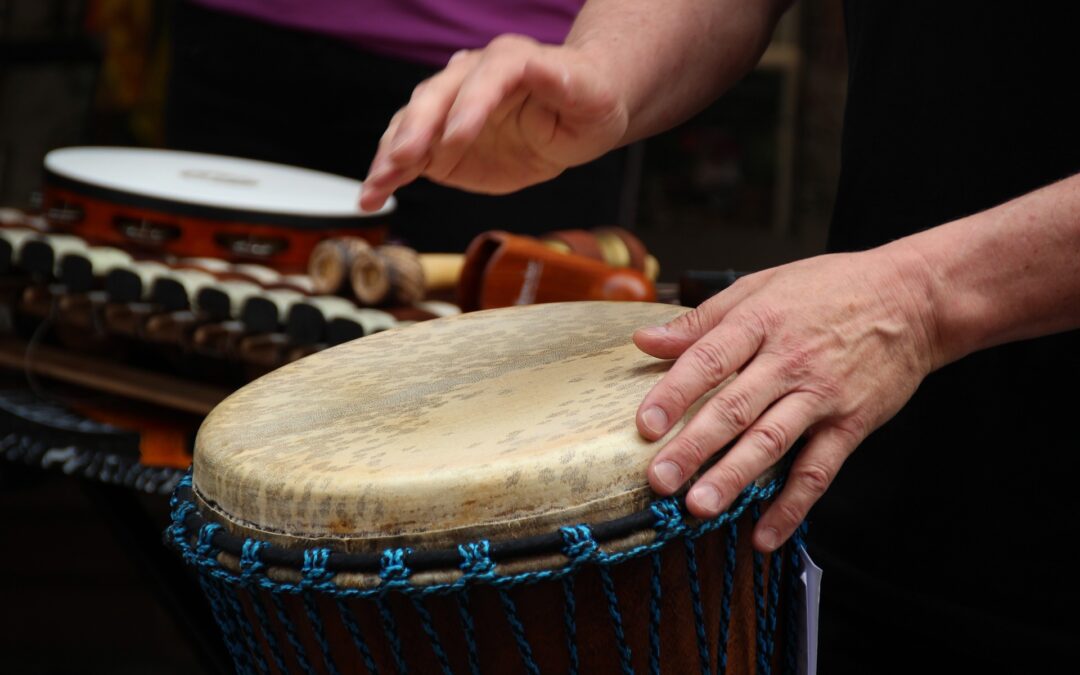
by Rick Davis | Dec 8, 2023 | Active Surveillance PCa, AYA, Blood Cancers, Brain Tumors, Cancer Caregivers, Cancer Resources, Complementary Medicine, Health Resources, mCRPC, Men 'Speaking Freely', Men's Breast Cancer, Mental Health, mHSPC, Multiple Sclerosis, nmCRPC, Ovarian Cancer, Pancreatic Cancer, Prostate Cancer, Recent News, RMC, Thyroid Cancer, Veterans, Women's Breast Cancer
Bang your drum… it could make you smarter and healthier!
I don’t want to work
I want to bang on the drum all day
I don’t want to play
I just want to bang on the drum all day
–Todd Rundgren
Twice in the last several months, the topic of drumming came up in our AnCan Men Speaking Freely group and it generated some excitement both times. So this month’s invite will be on that topic.In my former practice whenever I have given a non-verbal treatment there is a big relief that no talking is involved. In bypassing the verbal and left-brain systems we gain access to a typically unused part of ourselves. I wonder if we can use this approach to cope with our serious illnesses and have a better life?
Our brains have a characteristic called plasticity, the ability to change. You may have heard of this regarding the little finger brain circuit of violinists; it grows as they become proficient. Drummers also have different brains than the rest of us. They have fewer, thicker nerve fibers between the two halves of the brain. They have more efficiently organized motor cortices. (Schlaffke, 2019). Because of this, drummers can do things that we can’t. They can coordinate the two sides of the brain better, and perform motor tasks with greater efficiency. They can play different rhythms with each hand and foot at the same time.
Schlaffke’s subjects had drummed many hours per week for decades. But Bruchhage’s (2020) subjects trained for only 8 weeks and showed several changes in the cerebellum plus changes in the cortex, showing not only cerebellar plasticity but also communication and coordination between the cerebellum and brain sensorimotor areas as well as areas for cognitive control.
Drumming is very complicated, which is why it’s unfair that the lead guitar and vocal guy gets all the girls (Greenfield, J. 2022).
For some reason, there is a close association between beat synchronization (integrating auditory perception with motor activity) and reading ability in children (Bonacina, 2021). Higher synchronization ability predicts better literacy skills. Maybe early intervention involving drumming can improve literacy in kids?
Cahart et.al (2022) showed that drumming can improve behavioral outcomes for autistic adolescents and elucidated some of the neurology involved. Does this mean it could help us?
Drums have been used for millennia for healing, inducing trance, and even psyching up soldiers.
We have learned that drumming is not just about waking up the right brain, but also about connecting the sides of the brain, and the cerebellum with the cortex. It can induce alpha brain waves. It can release endorphins. Even T-cells respond to drumming (Bittman). It induces present-moment experience, which we often work toward to deal with death anxiety. Interpersonal connections are made when people drum together. Despite the effort involved, it induces relaxation. I have come across papers describing drumming and music therapy for a wide variety of emotional problems and currently, there are 8000 music therapists in the US.
How about for us? We see above the possibility of reductions in anxiety, tension, pain, isolation, depression, and over-thinking the past and future. There are many studies of music therapy in ICUs, with patients on ventilators, easing hemodialysis pain, with positive results. Also, helpful with narcotic use, social integration, and depression. MSKCC uses music therapy.
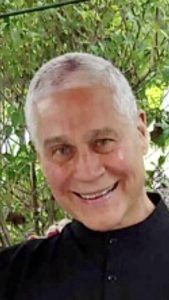 With terminal cancer, there is data showing that music helps breathing, QOL, psychospiritual integration, reducing pain in chemotherapy, radiation, and helps pediatric breast and lung Ca patients (Ramirez 2018, Hilliard 2003, Burns 2015 Tuinmann 2017, Barrera 2002, Li 2011, Lin 2011). Atkinson (2020) found improvement with fatigue. I couldn’t find any studies focused only on Prostate Cancer.
With terminal cancer, there is data showing that music helps breathing, QOL, psychospiritual integration, reducing pain in chemotherapy, radiation, and helps pediatric breast and lung Ca patients (Ramirez 2018, Hilliard 2003, Burns 2015 Tuinmann 2017, Barrera 2002, Li 2011, Lin 2011). Atkinson (2020) found improvement with fatigue. I couldn’t find any studies focused only on Prostate Cancer.
Well, all this scholarly stuff is really unnecessary to anyone who ever banged a pot with a wooden spoon. Kids love it. Adults love situations where it’s OK to be wild and make noise, such as drumming circles and Pound classes. It’s just fun and feels good.
Dr. John Antonucci
Editor: Dr. John wrote this for our Men Speaking Freely Reminder on Dec 7, 2023. It’s such a perceptive, helpful and instructive piece, AnCan wanted to share it widely.
by Hannah Garrison | Sep 27, 2023 | Advocacy, Cancer Resources, Health Resources, Mental Health

Here at AnCan, we like to highlight the perspectives of every person that enters our virtual “door”, so to speak. That includes religious perspectives; we are SO proud of how diverse our community is. So, as such, these views aren’t an official AnCan viewpoint.
Now that that’s out of the way, we just thought we would share a more religious perspective on a person’s cancer journey. In her blog, Stingray of Sunshine, author Dana Hendershot asks the question, “If it is truly a God blessing that my cancer was found early, then I also have to believe that God did NOT bless the person whose cancer wasn’t caught early.”
Author, and cancer survivor, Dana Hendershot, goes into depth about those words and phrases that others might deem comforting to someone going through cancer. Phrases like “God has his reasons” are the opposite of comforting for her.
CLICK HERE to read Hendershot’s blog post about her “Theological Quandary”
No matter our religious (or nonreligious) perspective, these sentiments may be felt by many in our community – regardless of which illness you may have.
Thank you to one of our fantastic MS Moderators, Jennifer Digmann, for the blog suggestion!!
Our MS group meets every 2nd and 4th Tuesday of the month. Check out our calendar for more info on our other groups.
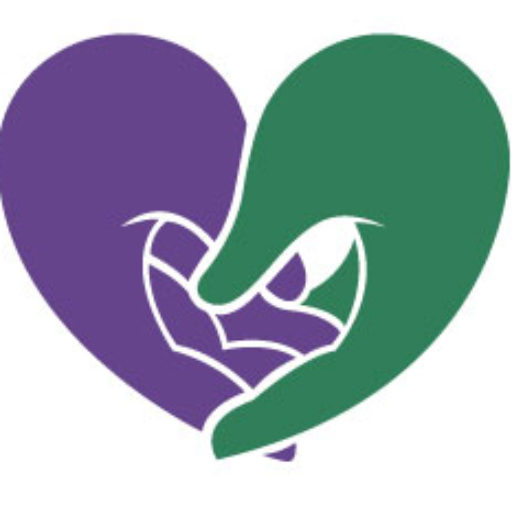
by Rick Davis | May 22, 2023 | Active Surveillance PCa, Advocacy, Blood Cancers, Brain Tumors, Cancer Caregivers, Cancer Resources, Health Resources, hospice and palliative, mCRPC, Men's Breast Cancer, mHSPC, Multiple Sclerosis, nmCRPC, Ovarian Cancer, Pancreatic Cancer, Prostate Cancer, Recent News, RMC, Sarcoidosis, Thyroid Cancer, Women's Breast Cancer
ICE Checklist … in case you go cold!
Last month’s Under 60 Stage 3 & 4 Prostate Cancer meeting was small, intimate and produced a true gem from Down Under to benefit all AnCan’rs …
For the life of me, I forget what raised the topic … maybe a Death with Dignity discussion – but Aussie AnCan’r, Steve Cavill told us about the ICE “In Case of Emergency” Checklist Document that he and his wife Leonie, who occasionally attends our Care Partners Group, have both completed. Steve and Leonie reside in the suburbs of Melbourne and are currently heading towards mid-Winter.
This ICE Checklist takes much, if not all, the difficulty out of placing your key information in one place. Like your vital passwords to your laptop, phone or bank accounts; names of key individuals in your life and more. You know .. all that information making it possible for someone to piece your life together if you’re suddenly no longer with us.
Frankly it’s information we should all compile no matter how old. With this checklist guide at hand to march us through it, there can be few excuses. Just remember, this version of the ICE checklist was created in Oz, so it may not be fully applicable Stateside. If one of our US volunteers has time to ‘Americanize’ it, I feel sure it will be greatly appreciated – we have very few solicitors in the US and a few too many attorneys!
Here’s the checklist document in Word format ICE Document Template Now do your part …. and a BIG THANK YOU, Steve Cavill!!
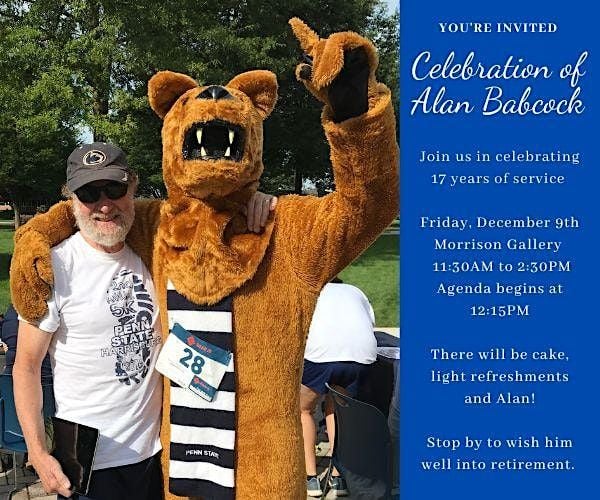
by Rick Davis | Dec 21, 2022 | Cancer Caregivers, Cancer Resources, nmCRPC, Ovarian Cancer, Pancreatic Cancer, Prostate Cancer, Recent News, RMC, Thyroid Cancer
Cancer Can Be a Glass Half Full!
Some of our Blog readers, have attended AnCan’s Speaking Freely virtual group. That’s our men-only meeting that talks about everything and anything EXCEPT treatment. It’s open to all men living with a chronic condition and provides a great opportunity twice a month to get things off your chest and to air issues where another perspective may help. Like all our meetings, it’s free and drop in on the 1st and 3rd Thursday of each month starting at 8.00 pm Eastern in our AnCan Barniskis Room.
 December’s second meeting of the month hosted a newbie to Speaking Freely but not to our AnCan Groups. Alan Babcock has been attending our prostate cancer groups for a while; he was finally able to vacate his schedule to make a Speaking Freely group. Alan recently retired from a hugely meaningful and rewarding career where he supervised Disability Services for students at Penn State – Go Nittany Lions!! Over the years, his team enabled thousands of disabled students to graduate .
December’s second meeting of the month hosted a newbie to Speaking Freely but not to our AnCan Groups. Alan Babcock has been attending our prostate cancer groups for a while; he was finally able to vacate his schedule to make a Speaking Freely group. Alan recently retired from a hugely meaningful and rewarding career where he supervised Disability Services for students at Penn State – Go Nittany Lions!! Over the years, his team enabled thousands of disabled students to graduate .
In the course of the SF group conversation, we spoke about how cancer has impacted our lives – positively and negatively. When Alan mentioned he’d be keeping track of all the gifts received from his prostate cancer experience, we immediately asked for a copy – and here it is.Thanks for sharing your vulnerabilities, Alan and for allowing others to learn and benefit! (Editor: We’ve chosen to put Prostate in parenthesis, because for the large part, we think this applies to most all cancers!! )
Gifts of (Prostate) Cancer
1. I experienced a flood of love and good wishes from family, friends, and colleagues.
2. I returned to therapy, and I deepened my self-understanding.
3. I had the opportunity to confront my mortality, which taught me to think about decisions I make day-to-day.
4. I saw my wife do battle with the medical establishment on my behalf and win.
5. My love for my wife deepened as we confronted a life crisis.
6. I watch myself travel from despair to acceptance. Once again, demonstrating my resilience to myself.
7. I was given the opportunity to learn how to love my wife in new ways.
8. For about the hundreth time, I saw my wife was a tower of strength, and I learned once again that she would always be there for me.
9. I felt my wife’s unconditional love as she held me while I cried for all of my losses.
10. I experienced what it was like to have somebody pray for me.
11. I took control of my well-being by firing my first urologist and finding better care elsewhere, which was empowering.
12. I talked to other men who had prostatectomies about highly personal subjects.
13. I started to learn how to engage in Mindfulness rather than just talking about it.
14. I experienced a high school friend showing how much he cared by not only investigating where I received treatment, but also the physician who was going to perform the prostatectomy.
15. My brother-in-law showed how much he cared by arranging a consultation with a physician at the Dana-Farber Cancer Center.
16. A professor, who I did not know well, gave me her telephone number, and told me to call any time day or night.
17. I learned what was helpful and what was unhelpful when someone was facing a life crisis.
18. I joined a support group, in which I learn much about prostate cancer and in which I receive support.
19. I am learning to accept my limitations.
20. I have helped other men, which has been rewarding

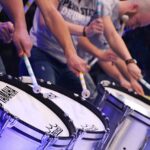
 With terminal cancer, there is data showing that music helps breathing, QOL, psychospiritual integration, reducing pain in chemotherapy, radiation, and helps pediatric breast and lung Ca patients (Ramirez 2018, Hilliard 2003, Burns 2015 Tuinmann 2017, Barrera 2002, Li 2011, Lin 2011). Atkinson (2020) found improvement with fatigue. I couldn’t find any studies focused only on Prostate Cancer.
With terminal cancer, there is data showing that music helps breathing, QOL, psychospiritual integration, reducing pain in chemotherapy, radiation, and helps pediatric breast and lung Ca patients (Ramirez 2018, Hilliard 2003, Burns 2015 Tuinmann 2017, Barrera 2002, Li 2011, Lin 2011). Atkinson (2020) found improvement with fatigue. I couldn’t find any studies focused only on Prostate Cancer.


 December’s second meeting of the month hosted a newbie to Speaking Freely but not to our AnCan Groups. Alan Babcock has been attending our prostate cancer groups for a while; he was finally able to vacate his schedule to make a Speaking Freely group. Alan recently retired from a hugely meaningful and rewarding career where he supervised Disability Services for students at Penn State – Go Nittany Lions!! Over the years, his team enabled thousands of disabled students to graduate .
December’s second meeting of the month hosted a newbie to Speaking Freely but not to our AnCan Groups. Alan Babcock has been attending our prostate cancer groups for a while; he was finally able to vacate his schedule to make a Speaking Freely group. Alan recently retired from a hugely meaningful and rewarding career where he supervised Disability Services for students at Penn State – Go Nittany Lions!! Over the years, his team enabled thousands of disabled students to graduate .